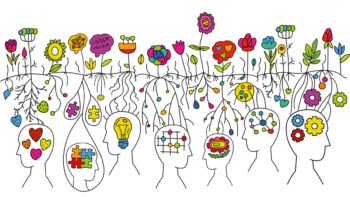Chanda Prescod-Weinstein reviews Anxiety and the Equation: Understanding Boltzmann’s Entropy by Eric Johnson

Eric Johnson’s beautifully titled Anxiety and the Equation: Understanding Boltzmann’s Entropy is a conundrum. The writing in this text, which doubles as an introduction to the life of Ludwig Boltzmann and his entropy formula, is unusually literary for a popular-science book. Johnson clearly has a knack for prose, and his passion – for both Boltzmann and the equation S = k log W that is considered to be his greatest accomplishment – shines through. For the reader who enjoys popular science that is a little technical in nature, this could be an enjoyable and, at 170 pages, fast read.
Yet I found myself struggling, greatly, with it. My deepest struggle was that I wanted to love the book because the structural ideas that underpin it are so fun. I love the idea of a biography that goes in reverse, and this is of course a poignant nod to the fact that the arrow of time is both irreversible and deeply enmeshed with the second law of thermodynamics, which the entropy formula illuminates. As time marches forward, entropy can only increase and the past is irretrievable. So the book begins with Boltzmann’s suicide and promises to work backward from there. It does, sort of. There are indeed episodes from Boltzmann’s life, but by the end I could not understand the exact thread that tied it all together. Johnson – a chemistry professor at Mount St Joseph University in Cincinnati, US – doesn’t tell us much about Boltzmann’s origins, and I would have preferred some nod to the traditional biography, even with this new fascinating twist.

My invisible battle
As a working physicist, I’m not exactly the target audience, and I tried to be conscientious about this as I read. But I am also a theoretical physicist who thinks that statistical mechanics is extremely undervalued in the physics curriculum, which is why I agreed to review this book. My hope was that this would be a text I might give to undergraduates, to give them a helpful qualitative discussion of the entropy formula. Indeed, Johnson seems to love explaining the entropy law, which quantitatively gives the relationship between the entropy of an ideal gas and the number of possible microstates – configurations of particles – for that gas. Indeed, arguably, this is the equation that allows us to have a sense of what entropy even is: a quantification of the number of microstates, given a macrostate, or the large-scale characteristics of the gas.
Johnson undoubtedly faces a daunting task: how to explain a fundamentally mathematical concept and equation without resorting to derivations that are written in equations? In many ways he succeeds – by relying on our intuition in an unusual way. Often we teach physics by hoping that our student will have an intuitive sense of how things usually work. Johnson flips this by beginning with a physical scenario that – based on everyday experience – we all have a strong intuition is highly unlikely or impossible. What is the likelihood that all of the air in a room is in the left half of the room or the right half, instead of evenly distributed across both? From here, Johnson is able to lead the reader to intuition about both microstates and macrostates, and he does it better than any textbook I’ve ever read.
Having read the book, I think I could give this book to undergraduates, but would only recommend it to them with a caveat: ignore nearly everything that Johnson has to say about anxiety and mental health because it’s just one man’s opinion, which he never backs up.
Chanda Prescod-Weinstein
Even so, he ultimately relies on equations to explain the logarithm that appears in the formula, and after such a creative attack on microstates, this is a bit disappointing. In either case, this is not a book I would give to someone who is uncomfortable with maths, and I won’t be giving it as a present to family. Having read the book, I think I could give this book to undergraduates, but would only recommend it to them with a caveat: ignore nearly everything that Johnson has to say about anxiety and mental health because it’s just one man’s opinion, which he never backs up.
Boltzmann displayed behaviours that have, in hindsight, been pathologized as signalling mental illness, possibly bipolar disorder. In his text Johnson argues that it was more likely an anxiety disorder. Although he caveats his comments with a reminder that he’s not a health professional, Johnson draws some rather strong conclusions, both about the possibility of an anxiety disorder and the nature of anxiety, which he calls a “21st-century disease”. He goes on to explain that by this he means that one can only feel anxious in a context where one’s basic needs are already taken care of, and that in fact, anxiety is irrational. Along with his casual use of “crazy”, this explication of anxiety disorder troubled me. An alternative interpretation that he does not grapple with at all is that in the 21st century, we are becoming more conscious of how the brain works, rather than that we are becoming more sensitive. Does this mean that those of us who have experienced poverty could not be diagnosed with anxiety disorders because we only felt fear in those moments? Many racialized people experience racism-related anxiety, even if they are from comfortable income backgrounds. Do the conclusions that Johnson draws apply outside of the Global North? If not, does this mean that the Global South is not in the 21st century?
My wish is that Johnson had chosen – or been encouraged to – engage with disability justice literature, which problematizes the common use of “crazy” because of the way casual uses of this language actually harms disabled people. My worry about sharing this with undergraduates is that we know they experience significant amounts of anxiety, and I would be concerned that this text could make them feel bad about it, although that’s clearly not Johnson’s intention. Johnson in fact ends his book by saying Boltzmann was “a kind man with a generous mind”. I wish I had gotten this sense from the book, but these qualities were never emphasized to provide context for what anxiety might have really meant in Boltzmann’s life.



